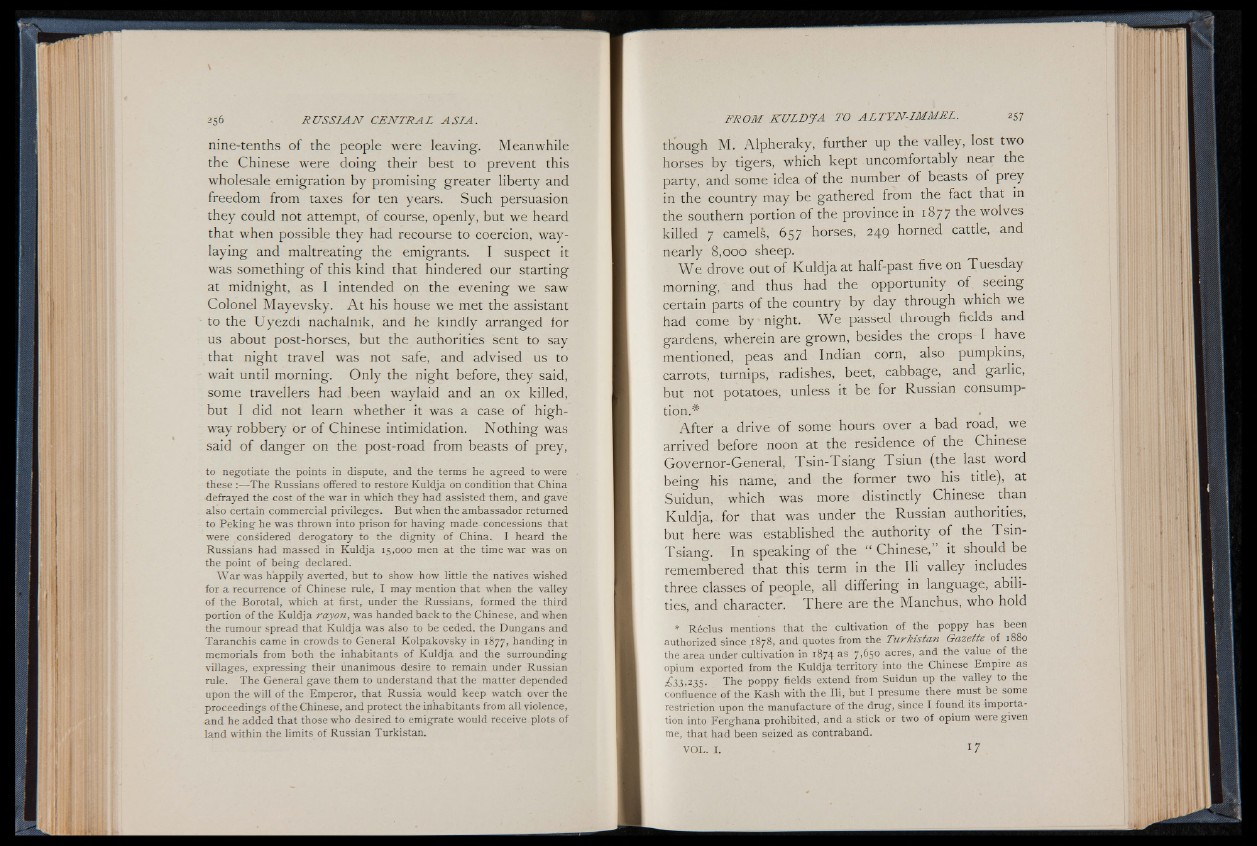
nine-tenths of the people were leaving. Meanwhile
the Chinese were doing their best to prevent this
wholesale emigration by promising greater liberty and
freedom from taxes for ten years. Such persuasion
they could not attempt, of course, openly, but we heard
that when possible they had recourse to coercion, waylaying
and maltreating the emigrants. I suspect it
was something of this kind that hindered our starting
at midnight, as I intended on the evening we saw
Colonel Mayevsky. A t his house we met the assistant
to the Uyezdi nachalnik, and he kindly arranged for
us about post-horses, but the authorities sent to say
that night travel was not safe, and advised us to
wait until morning. Only the night before, they said,
some travellers had been waylaid and an ox killed,
but I did not learn whether it was a case of highway
robbery or of Chinese intimidation. Nothing was
said of danger on the post-road from beasts of prey,
to negotiate the points in dispute, and the terms he agreed to were
these :— The Russians offered to restore Kuldja on condition that China
defrayed the cost of the war in which they had assisted them, and gave
also certain commercial privileges. But when the ambassador returned
to Peking he was thrown into prison for having made concessions that
were considered derogatory to the dignity of China. I heard the
Russians had massed in Kuldja 15,000 men at the time war was on
the point of being declared.
W a r was happily averted, but to show how little the natives wished
for a recurrence of Chinese rule, I may mention that when the valley
o f the Borotal, which at first, under the Russians, formed the third
portion of the Kuldja rayon, was handed back to the Chinese, and when
the rumour spread that Kuldja was also to be ceded, the Dungans and
Taranchis came in crowds to General Kolpakovsky in 1877, handing in
memorials from both the inhabitants of Kuldja and the surrounding
villages, expressing their unanimous desire to remain under Russian
rule. The General gave them to understand that the matter depended
upon the will of the Emperor, that Russia would keep watch over the
proceedings of the Chinese, and protect the inhabitants from all violence,
and he added that those who desired to emigrate would receive plots of
land within the limits of Russian Turkistan.
though M. Alpheraky, further up the valley, lost two
horses by tigers, which kept uncomfortably near the
party, and some idea of the number of beasts of prey
in the country may be gathered from the fact that in
the southern portion of the province in 1877 the wolves
killed 7 camels, 657 horses, 249 horned cattle, and
nearly 8,000 sheep.
We drove out of Kuldja at half-past five on Tuesday
morning, and thus had the opportunity of seeing
certain parts of the country by day through which we
had come by night. We passed through fields and
gardens, wherein are grown, besides the crops I have
mentioned, peas and Indian corn, also pumpkins,
carrots, turnips, radishes, beet, cabbage, and garlic,
but not potatoes, unless it be for Russian consumption.*
After a drive of some hours over a bad road, we
arrived before noon at the residence of the Chinese
Governor-General, Tsin-Tsiang Tsiun (the last word
being his name, and the former two his title), at
Suidun, which was more distinctly Chinese than
Kuldja, for that was under the Russian authorities,
but here was established the authority of the Tsin-
Tsiang. In speaking of the “ Chinese,” it should be
remembered that this term in the Ili valley includes
three classes of people, all differing in language, abilities,
and character. There are the Manchus, who hold
* R6clus mentions that the cultivation of the poppy has been
authorized since ,1878, and quotes from the Turkistan Gazette of 1880
the area under cultivation in 1874 as 7,650 acres, and the value of the
opium exported from the Kuldja territory into the Chinese Empire as
¿ 3 3 , 2 3 5 . The poppy fields extend from Suidun up the valley to the
confluence of the Kash with the Ili, but I presume there must be some
restriction upon the manufacture of the drug, since I found its importation
into Ferghana prohibited, and a stick or two of opium were given
me, that had been seized as contraband.
VOL. I. I 7